A grassroots coalition has emerged – in the face of Band Council opposition and violent police raids – to set rules and to ensure the safety of Indigenous cannabis industry at Six Nations.
From realpeoples.media original article July 13 2020
SIX NATIONS – The ongoing saga of cannabis dispensaries at Six Nations has taken a new turn with the launching of an “interim cannabis agreement” on July 1st 2020, by the Six Nations People’s Cannabis Coalition (SNPCC), a grassroots group representing local cannabis entrepreneurs. The Coalition signed up over 30 members over three days who agreed to an Interim Retail Agreement to ensure product safety and testing as well as on-site inspection and compliance checks.
The agreement stipulates businesses will follow COVID-19 health and safety requirements and make a minimum “community contribution” of 1% of their sales to a “community initiative fund” to give back to the people. SNPCC’s regulations are a result of months of discussion and numerous open meetings held at the historic governance site of the Council House in Ohsweken. The Coalition’s framework addresses health and safety issues, store location, prohibits product advertisements, and refuses service to those under the age of 19. While proponents of the framework made numerous overtures to the Six Nations Elected Council (SNEC) and its Cannabis Commission, these efforts came to naught. The Coalition’s efforts are not endorsed by Band Council or connected to Canadian institutions.
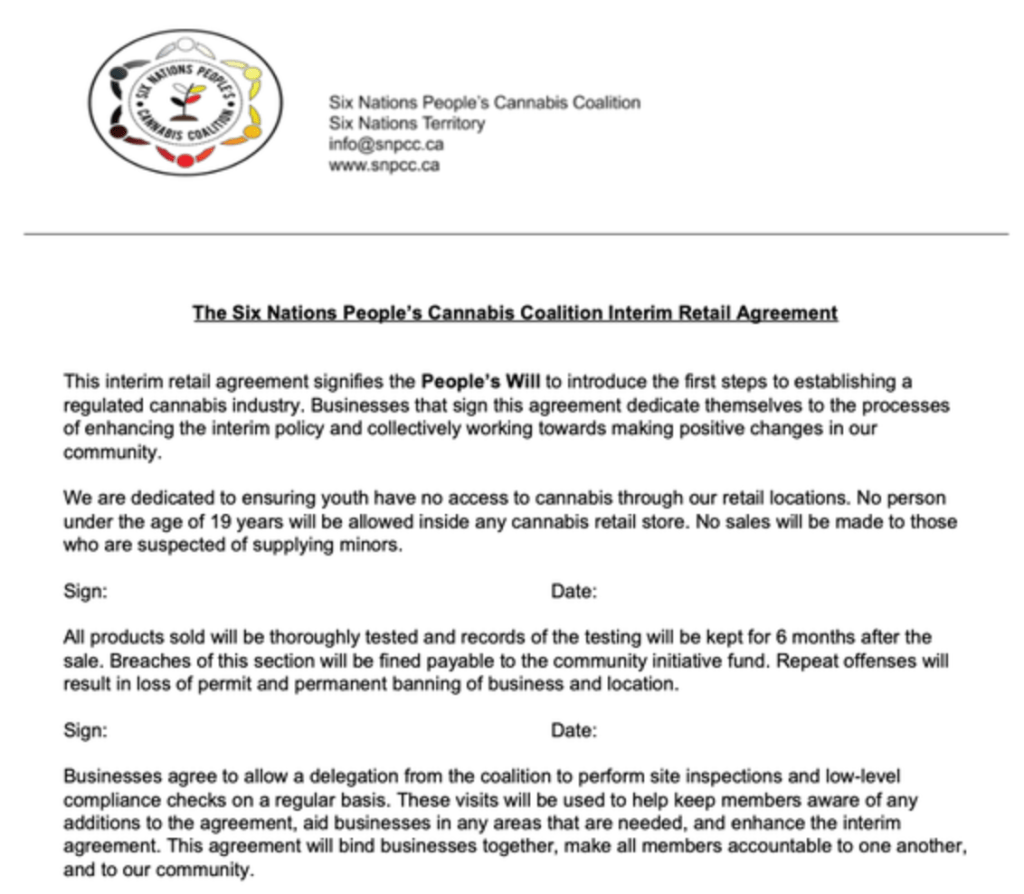
The Six Nations Elected Council (SNEC), despite being a creation of Canada’s Indian Act, has recently rebranded itself as the “Six Nations of the Grand River” and is claiming jurisdiction to regulate the sale of cannabis in the territory. Claiming that it “owes a duty of care” to “its members and residents” SNEC’s “Interim Cannabis Control Law” is “enacted pursuant to the authority of the Six Nations Elected Council’s duty to govern in the best interest of its community’s health and safety in the spirit of good governance.” On May 23rd, 2019 SNEC created an “arms length,” Cannabis Control Commission for the purpose of “regulating, enforcing, and administering” their law. That law is not available for viewing on either the websites of SNEC or its Cannabis Commission.
According to a statement posted on the Commission’s Facebook page, it declined to support the efforts of the SNPCC because “the benefits of launching an incomplete cannabis regulatory framework would not outweigh the risks and as such determined an interim regime was not feasible.” Instead, the SNCC has hired a team primarily composed of non-Indigenous experts in “environmental planning, regulatory oversight, business strategy, and legal affairs.” The commission now anticipates being in a position to accept “applications for production” in November of 2020, and applications for retail outlets in the spring of 2021.
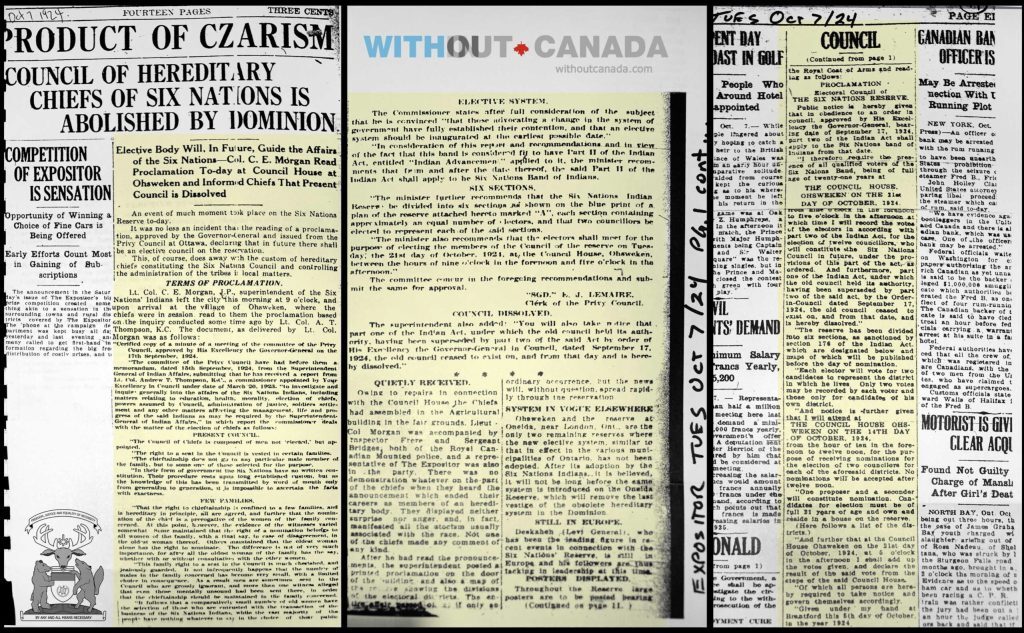
SNEC’s legal authority and jurisdiction are derived from the Indian Act and a Privy Council proclamation read by RCMP Col. C.E. Morgan in Six Nations on October 7, 1924. At that time, under the leadership of Indian Affairs Deputy Minister Duncan Campbell Scott, the RCMP established a military barracks in Ohsweken, and drove the traditional governance structure of Chiefs and Clan mothers underground. Canada seized the archives and the Old Council House of the traditional confederacy along with their treasury and many original wampums. The first elected council had to include Six Nations men employed by the Canadian government, since Canada couldn’t otherwise find 12 men to stand for office. The election and subsequent Indian Act council was administered under the direction of the local Indian Agent in accordance with Canada’s laws. The first election was decided with a total of 56 ballots cast, which according to Chief David Hill Sr. were “simply the result of a mere 26 people voting multiple times.”
The vast majority of people in Six Nations have since continued to abstain from voting in Band Council elections, and traditional governance structures continue to operate to this day. In the most recent elections, held in November of 2019, out of a total of over 20,000 eligible Six Nations members, only 700 people voted for Mark Hill, the current elected Chief. In the summer of 2019, Six Nations people opposed to the autocratic rule of SNEC, shut down the offices for 67 days by means of non-violent protest.
Colonial prohibition of cannabis continues at Six Nations
Despite the position of the Six Nations Elected Council that it has the right to establish a cannabis law on reserve, that perspective is disputed not only by the People’s Coalition and traditionalists, but by the Government of Canada itself.
According to Indigenous Services Canada spokesperson William Olscamp, it is Canada’s position that “There are no specific authorities or definitions in The Indian Act for the regulation of cannabis.” Furthermore, “under the Cannabis Act, those wishing to produce and sell cannabis products need to obtain the appropriate federal, provincial or territorial licence.” In other words, Canada has given Band Councils (created by the Canadian Parliament) no authority over its cannabis laws, which were developed and implemented without consultation with Indigenous peoples. Instead, Canada has been pushing Band Councils to develop regulations on reserves which are compliant and “harmonized” with Federal and Provincial cannabis laws and which use only Health Canada approved LP cannabis.
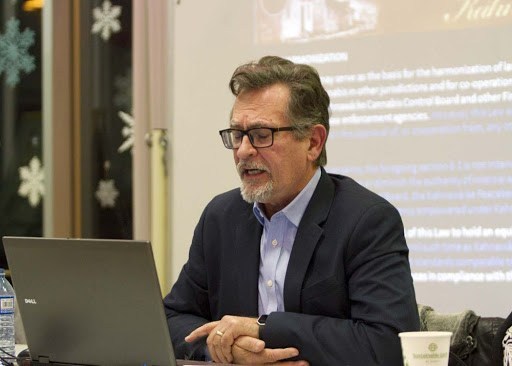
It was in this context that Indian Act governance structures such as the Mohawk Council of Kahnawake (MCK) developed their own cannabis laws to regulate cannabis on their territory. Lawyer Murray Marshall established the MCK’s Legal Services department in the 1990’s, and has drafted numerous laws for the MCK including the Kahnawake Gaming Law, the Kahnawake Alcoholic Beverages Control Law, the Kahnawake Membership Law, the Kahnawake Peacekeepers Law and the Kahnawake Cannabis Control Law. Marshall’s cannabis law was passed in December of 2018 over the resolute objections of community members in a process mired in controversy.
The basis of Kahnawake’s law – just like SNEC’s – is that it prohibits and criminalizes the “production, distribution, sale, possession and use of cannabis” on the territory. After prohibiting the cannabis economy of the people of Six Nations – which dates to at least as early as a Dutch-Mohawk treaty agreement symbolized by a rope made of hemp in the early 1600s – SNEC’s cannabis law then offers the sale of “permits” issued by SNEC to provide exemptions to cash in on their prohibition of cannabis.
The catch? The protocols and standards involve Health Canada oversight, align with Federal and Provincial regulations which don’t belong on the Haldimand Tract, and involve the payment of an 8% tax of “gross cannabis sales at the end of each month” that go directly to SNEC, a corporate body of the Canadian government.
Furthermore, there is no legal guarantee that the cannabis “laws” passed by the Indian Act Band Councils will protect licensees from criminal charges under Canadian Criminal Code. In a case involving a Six Nations dispensary raided in the fall of 2017, a Superior Court of Ontario Judge stated that it was her opinion that because the Band lacked authority and jurisdiction to make a cannabis law, such a law would be of no effect in protecting Six Nations people from prosecution under Canada’s Cannabis Act.
Given this dynamic, it is perhaps not surprising that as of July 2020, there are still no operational Band Council regulated cannabis dispensaries in Kahnawake or Six Nations – despite both having passed “cannabis laws.” This is in contrast to the communities in Kanehsatake, Tyendinaga, Alderville, Pikwakanagan, Oneida, and Walpole Island, which all have a booming cannabis industry with in excess of a dozen cannabis dispensaries operating in their territory. None of the stores in these communities are operating with Band Council or Canadian laws in place, instead operating in accordance with customary rights and local norms.
Cannabis long used and distributed at Six Nations
For generations cannabis has been grown at Six Nations, and numerous homes and storefronts in Six Nations have served as unofficial dispensaries where cannabis is available for purchase. Cannabis is well regarded at Six Nations as a medicine, as revealed by a December 2017 cannabis survey organized by the dispensary Green Health for 6 in which 731 Six Nations members participated.
The survey reported that 95.1% of respondents considered cannabis to be a medicine; 94.9% of respondents believe that adults wishing to purchase cannabis for medical purposes should be able to purchase it at dispensaries on reserve; and a further 86.4% supported recreational dispensaries on reserve. As for who should get a say in any rules or regulations concerning cannabis at Six Nations:
“A majority of respondents – 53.6% – think that cannabis consumption should be “regulated” by traditional medicine people and according to Haudenosaunee custom. 28.2% said the industry should be regulated by an association of Indigenous cannabis retailers. Only 4.4% said they thought cannabis consumption should be regulated by the Six Nations Confederacy Council, and an even smaller number of 3.1% thought that the Six Nations elected council should have a say. The smallest number of respondents, 1.6% felt that cannabis at Six Nations should be regulated by the Province of Ontario and the Government of Canada.”

In August 2017 SNEC organized its own community survey, with 339 respondents. In answer to the question of “Would you like to see Methadone Clinics on Six Nations?” 37.31% said Yes, and 62.69% said no. Another question asking vaguely “Should Six Nations [unclear if that means Band Council or the community at large] get involved in medical cannabis?” was answered 51% Yes, 24.5% No, with 24.5 needing more information or not being sure. There are currently at least three methadone clinics on the reserve.
During the 2017-2018 efforts of Green Health for 6 to organize community meetings to discuss cannabis on the territory, the Six Nations Band Council took action to disrupt the meetings and locked the people out of their own meeting rooms. According to then Senior Administrative Officer Dale Bomberry “I made the decision in relation to a resolution that was already made [by Band Council] that they’re not supporting it because of the public perception of it, and until it’s finalized with the province in relation as to how they’re going to do their legislation and enforce their legislation.”
According to an article on the matter in Dispensing Freedom, “The Band Council “resolution” that Bomberry appears to be referencing is a July 7th, 2017 SNEC media statement that restates Canadian law concerning medical cannabis. According to Bomberry, SNEC will not allow community buildings to be used as a place for public dialogue on matters relating to cannabis until after July 2018, when the Federal Canadian government has “legalized” the cannabis plant.”
Green Health continued to hold meetings and events including one entitled “Medicinal Cannabis – Healthcare for Seniors Information Session” on March 23, 2018. This event was originally booked at the meeting hall of the Six Nations Tourism building, but the booking was cancelled by SNEC, and the event held at Yogi’s Barn instead. The event featured presentations for seniors by representatives of Green Health and Mukwa Botanicals on how medicinal cannabis can improve their healthcare.
Another meeting featuring Mohawk elders Kanasaraken Loran Thompson, Ateronhiata:kon Francis Boots and Tekarontake Paul Delaronde was held at Yogi’s Barn on March 27th, 2018. The event was sponsored by local dispensaries Herbal Releaf CBD+ and King Leaf and Smoke Signals Media.
Topics discussed at the meeting included the Onkwehon:we relationship to cannabis, the implications of the Canadian legalization of cannabis for Onkwehon:we people, and what lessons for cannabis can be learned from the experience of the Tobacco industry.
SNEC and its representatives did not attend the meeting or any of other public cannabis meetings organized by the people of Six Nations, and refused to answer the correspondence of or to meet with dispensary owners or their representatives.

SNPD raids – violence in the service of colonialism
Rather than address the concerns of the Six Nations dispensary owners and the members that support them, SNEC and the Six Nations Police Department (SNPD) turned to an increasingly violent campaign of repression against cannabis dispensaries in the wake of the surveys, public meetings, and petitions organized by local dispensaries.
In July of 2017 the SNPD raided the Medixinal dispensary, on Highway 54. All charges were dropped in March of 2018 after the Crown was unwilling to provide the defendants with disclosure 18 months after the arrests were made. The defendants did not regain the money or product taken by the Six Nations police.
On November 16th, 2017 Mohawk Medicine, a traditional herbal dispensary providing cannabis among hundreds of other herbal medicines, was raided by a SNPD team that brought a battering ram to smash down the door and pointed AR-15 assault rifles at medicine people and elders. The charges were fought by means of a constitutional challenge, and were eventually dropped, although again, the defendants did not regain the property or money taken by the SNPD.
On January 16th, 2018 three days after the initial results of the Six Nations Cannabis Survey were published online, Green Health for 6 was raided, with four arrests and a seizure of money and products.
In April of 2018, SNPD repeatedly raided locations belonging to King Leaf, again taking product and money and making multiple arrests. In an interview with Dispensing Freedom, King Leaf manager JR Hill said “It’s just like tobacco back in the day.” Hill added, “The cops are trying to rob us of our inherent right. Half of the people down here are all employed in tobacco. We had to fight for our right to build a tobacco economy. All those tobacco millionaires did time in jail back in the day for ‘contraband.’ What’s going on right now is no different…. I’ve sold cannabis half my life and there’s no way this is right. They didn’t leave no paperwork or nothing.”
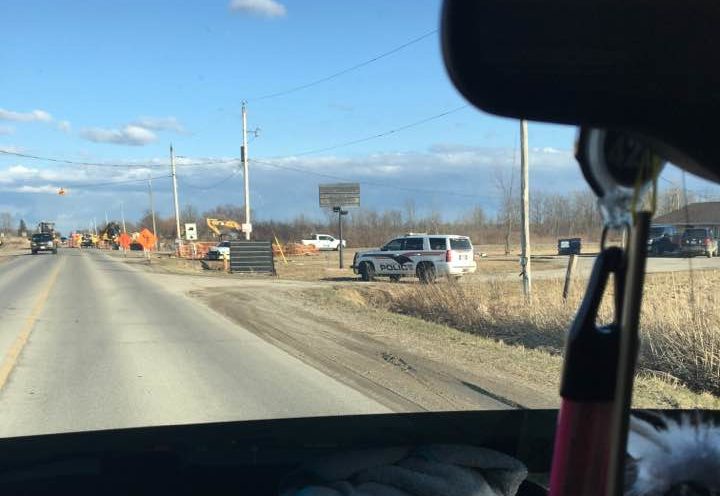
On October 9th, 2019, the SNPD raided the Green Cross dispensary and violently apprehended four young Six Nations men, pointing guns in their faces, beating them, and refused one young man – Dallas Porter – access to a suction machine and Q-Tips to clear his tracheostomy tube. This refusal of medical services could have been potentially fatal.
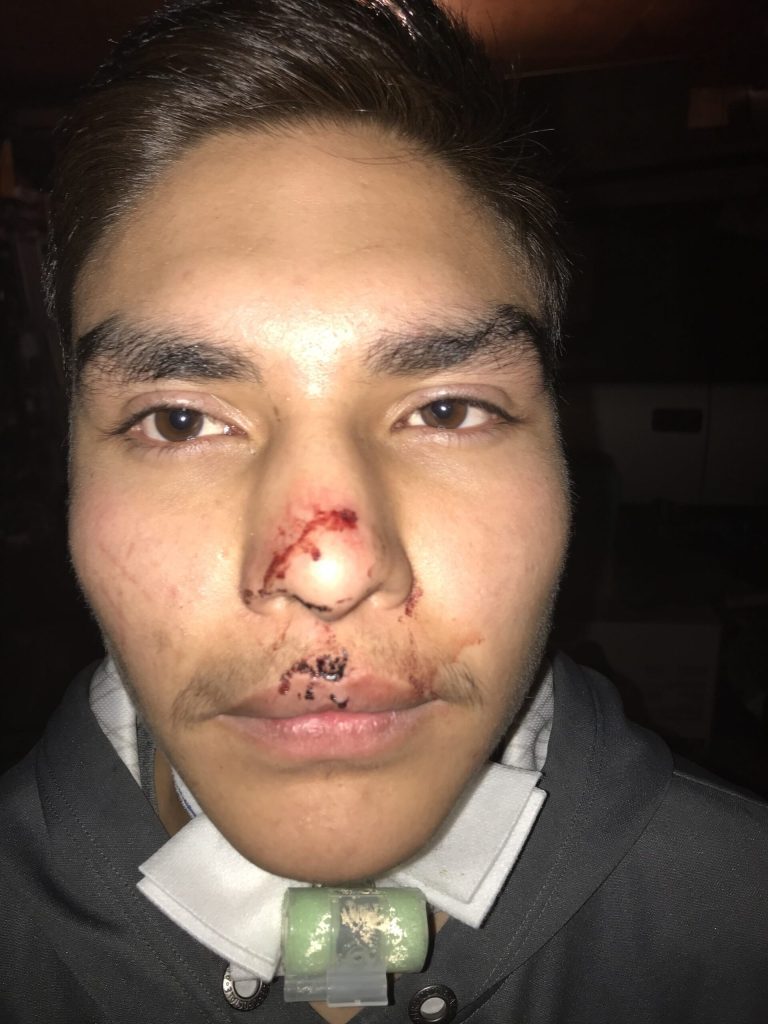
In a video interview conducted by Rhonda Martin for her online show Got Something to Say? with Dispensing Freedom, Ryan Davis, 25 who was inside the store at the time, said “I just saw someone dressed in all black [through the window] and there was just a gun in my face and I thought it was a robbery at first… we have a robbery procedure where we have these steel rolls downs, so I pulled those down.” According to Davis, once the police entered the building, “they sucker punched me out of nowhere … then they started kicking and stomping on my head”. Davis developed a golf-ball-sized hematoma on the side of his head and was put on concussion watch by the hospital.
In a June 30th, 2020 interview with Real People’s Media, Mike Davis, one of the Green Cross owners, spoke about the SNPD acting as rogue cops, hurting community members. “These officers are out of control. They’re assaulting community members, they’re lying about it, they’re threatening community members.”
After the death of George Floyd, and a continent wide rebellion against police brutality, Davis had no problems drawing the links between the Indigenous and Black struggles for freedom. “It’s Black Lives Matter and its Red Lives Matter. We both went through the struggle, we both felt that racism and oppression. We felt that excessive force of the police. We’re right there with them. We’re being victimized every single day by these police officers, out on these streets… We’re seeing that in our communities as well, with the cops not caring about anyone’s safety. They murdered George Floyd and they could have easily murdered my friend Dallas Porter. It resonates very closely with us because we’re going through a very similar situation,” said Davis.
The young men of Green Cross are not giving up in their fight for justice. Charges were dropped against Dallas Porter and Alyziah Styres, while Ryan and Mike Davis remain charged but nine months later, they have still not received the police disclosure against them. There is no independent review body available to which they can appeal their treatment, and their requests for review were dismissed by the SNPD, who didn’t even bother to interview the men about their complaint.
Justification for raids from the Six Nations Police
Police at Six Nations have carried out more cannabis raids on the territory than have occurred on any other reserve in Canada. According to Dispensing Freedom interviews with SNPD Staff Sergeant Dave Smoke and Steve Williams, a former Six Nations elected Chief who now sits as both the Chair of the Six Nations Police Commission, and the President of Grand River Enterprises International, the SNPD says it is carrying out the raids in support of community values in Six Nations.
According to Smoke, “we’re not part of the OPP, we are our own stand alone First Nations Police Service. What that means is that we have our own Police Commission that we operate under, that looks after us… we are our own autonomous First Nations stand-alone Police Service, the OPP has no influence or directive towards us.”
Although the funding for the SNPD comes from both the federal and provincial governments, that doesn’t mean that the SNPD believes it has to enforce all Canadian laws equally – or at all. According to Commissioner Williams, “Six Nations and all First Nations in Ontario are unique because the province of Ontario doesn’t have authority over any of the Federal lands where the First Nations are. Secondly, it’s up to the community what they want us to police.”
Speaking of tobacco enforcement, Williams, President of GRE – the largest Indigenous tobacco company in the world – said “You call it ‘contraband,’ we don’t. That’s just the government position to say everything is illegal. Well that’s not true. For us it’s our own sovereign right to do what we want to do. If we want to make any kind of business, that’s our business.”
Williams continued. “Government shouldn’t be telling us what to do. We have an agreement with the Queen, with the King, when we first got here and it says neither one will bother each other. We don’t bother the government, and they don’t bother us. We do what we want to do…. Right now, we don’t feel that we have any counterfeit or contraband tobacco on the reserve. If people want to make cigarettes or distribute cigarettes, as long as they’re selling to their own people, there should be no issue.”
When asked what would need to happen to stop the police raids on medicinal cannabis dispensaries, Smoke was clear. “It would have to become clear to the Police Service that this is what the community wants.” “The community made it clear to the police and we felt that that was what the message was, that they did not support any kind of cannabis activity on the territory and that’s where we’re taking our enforcement and mandate from to continue to enforce against these illegal dispensaries. Now if the tide changes, and cannabis becomes legal within the country and the Province, that may change things. I can’t speak for that right now. Until it becomes legal, unfortunately it is illegal, and we will have to keep enforcing, raiding these dispensaries.”
On cannabis he said, “at this point yes. It still is a drug. But if the community comes back and says we are okay with cannabis, then so be it. They told us they were okay with tobacco, so be it.” When asked what word other than “drug” he would use to describe cannabis once it became legal, Williams was unsure.
In recent months, the Six Nations Band Council has called upon Williams to resign from his position as Chair of the Police Commission board to “ensure accountability and transparency and make it clear that there can be no conflict of interest, or perceived or otherwise in such important roles.”
In an interview with the Brantford Expositor, Williams indicated that he would not be resigning, saying “I’ve done nothing wrong. I was elected chair by the other members of the commission and I serve as a community representative.” Williams said that only the other members of the commission had the authority to remove him and added, “I don’t know where this is coming from or why this happened. It has been suggested that it’s because I’m president of GRE but I’ve been there for 25 years and served as a police commissioner, off and on, for 18 years and, in all that time, there has never been a problem.”
The implosion of the Six Nations Cannabis Commission
A significant part of the delay and controversy in developing a working regulatory system at Six Nations came from internal contradictions within the Six Nations cannabis commission itself. The commission was created by SNEC on May 19th, 2019 and was composed of Cole Squire, former child services worker Audrey Hill, Two Row Times editor Nahnda Garlow, businessman Nick Wyman, and musician Derek Miller. Less than two months later, the commission was in shambles as the “arms length” SNEC intervened to overturn the decision of the majority of the commission to give an R&D permit to a local Six Nations grower, and removed SNCC member Nick Wyman. Commissioner Derek Miller resigned shortly thereafter.
According to Nick Wyman, the commission imploded over a decision to endorse a Cold Climate Cannabis R&D project from a Six Nations member who had met the appropriate criteria. According to Wyman, she had no criminal record, had a lease on the property, a business proposal, passed a police record check, and “she was a good candidate to be given this project.” SNCC voted 3 members to 2 to endorse the project, with Nahnda Garlow and Cole Squire dissenting.
On July 11th Garlow and Cole sent a letter to SNEC to “formally oppose” the decision and to call for an appeal on the commission’s decision by SNEC because they claimed that the commission had not seen an application form or business plan with the required information and thereby not acted in “fairness or in the best interests of the community.” Garlow also noted that on a tour of the facility, commissioners “observed several cannabis extract products being made” that were prohibited by federal law, and that her and Cole Squire’s “observations have now been documented and Six Nations Police Drug Enforcement Unit has been informed.”
Wyman says that the paperwork was in fact completed, and that the cannabis extracts were specially prepared for the commission as part of an education component of the tour. “They walked us though the CO2 extraction process start to finish. No product. Just an explanation. They did show us some shatter in different forms and different outcomes. I stand firm by saying there couldn’t have been more than 10-15 grams of shatter total. It looked like they spilled something on a pan and it was hardening. It wasn’t very thick. Truly looked like you spilled milk.”
Wyman thinks that what was really behind the conflict was the fact that the commission had moved forward to green light local Six Nations cannabis production, and that that may have disrupted a deal that SNEC or its Economic Development arm might have already had in place with Seven Leaf, a Licensed Producer of cannabis founded by former police officers in Akwesasne which follows Federal rules and wanted to provide supply for Six Nations.
According to Wyman, “I think there was an agreement made with Seven Leaf to supply Six Nations, and one of the prospective permit appliers had set up a line of communication asking about getting to supply for them [from Seven Leaf]. They had said no, we can’t give you that supply because there’s already an agreement in place with Six Nations. Hence that’s about as close to the smoking gun as it gets – that I am aware of.”
Wyman added, “It appears that there was some form of agreement made between Seven Leaf and Six Nations to supply Six Nations with product for X amount of time…. I think there was money at the core of this and I think the fact that we had product on Six Nations that would have been grown by a Six Nations member was the problem in the end. It wasn’t the R&D permit itself, it was the fact that it would be home grown Six Nations product, and if there’s an agreement that’s been made with another company to supply Six Nations then they’re gonna lose out on all that revenue because there’s Six Nations product to be purchased now.”
This was also the point at which SNEC took full control of the Commission and halted its efforts to open up the industry on reserve. “Right after this happened, and us going in front of council, counsellors were now at the meetings and things have changed. The arms length had changed drastically. Unless they’re talking about a T-Rex, the arm length disappeared.”
In another interview with Dispensing Freedom, Wyman also revealed that Lorraine White, a member of the “leadership team” of the Akwesasne based LP Seven Leaf, sat on the hiring committee chosen to establish the Six Nations Cannabis Commission. This is a clear conflict of interest because Seven Leaf is trying to become a cannabis provider to Six Nations, and thus has a clear financial interest in the decision of the Six Nations Cannabis Commission.
According to Wyman, “In August of 2019 the Cannabis commission should have stepped down out of respect for the community. I’d say by now if the two people on the current commission didn’t make it their mission to stop Cannabis from moving forward, and just accepted that they got outvoted, hundreds of our people would be employed by this industry and millions of dollars would have been flowing into our community.”
SNCC vs. SNPCC and the Indigenous cannabis movement
As a result of the conflict within the SNCC in the summer of 2019, the commission went on hiatus, and no licenses or permits were given out. Local Six Nations entrepreneurs, many of who have been involved in selling cannabis on the reserve for decades, decided to step up and create the Six Nations People’s Cannabis Coalition to self-regulate the industry as has been done in Tyendinaga, Alderville, Pikwakanagan, and along the North Shore of Lake Huron.
Ben Macdonald, a member of SNPCC, has raised concerns with the lack of democracy, transparency, and financial accountability in the SNCC. In a recent Facebook post, Macdonald wrote “Our ‘North Star’ should contain our people’s ideologies of democratic action, not the dictatorship we see from the SNCC… SNCC’s team of strategically formed industry experts excludes and devalues the voices of our community. SNCC was offered all of the professional services needed as a donation by multiple community businesses and members, how much has SNCC consultants and contracts cost the community? Why wasn’t that money invested in our community to bring our voices together?”
According to SNCC files leaked to Real People’s Media, the projected cost of the SNCC’s yearly operations are $400,000.
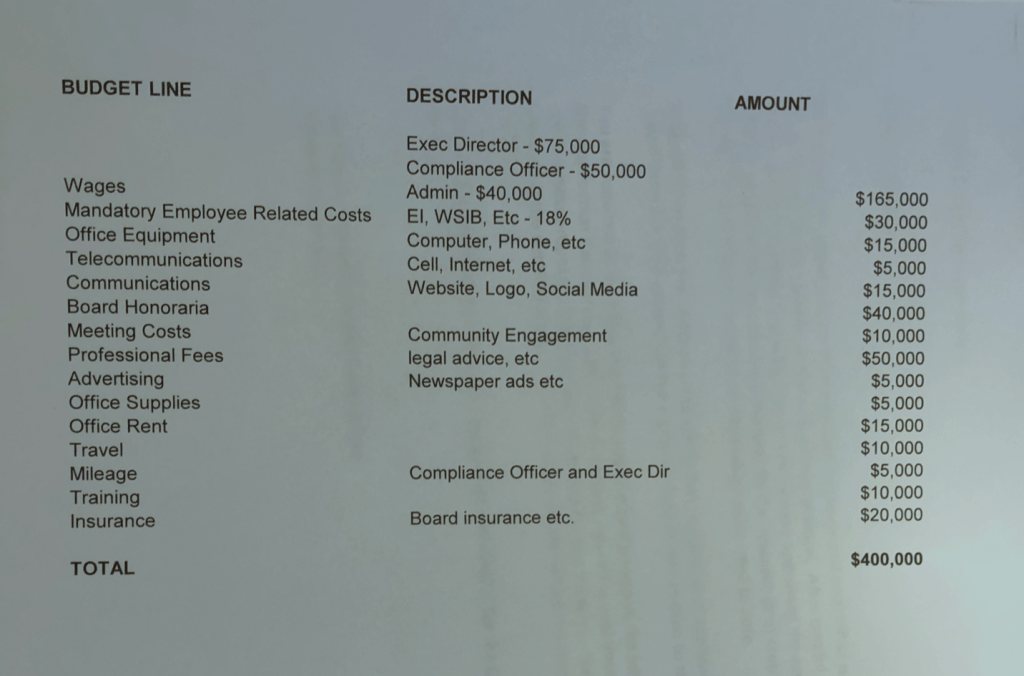
In a Facebook post, Macdonald summarizes his understanding of the actions of the SNCC as follows:
“SNCC continually chooses to go down the wrong path and the community has begged you to work in partnership and collaboration with us but SNCC is only interested in voices that echo their perspective. SNCC has worked harder at restricting information and keeping the community in the dark then building the relationships within that are necessary to successfully put out the first industry regulatory regime we will see in Six Nations…. SNCC has the opportunity to work openly with the community to complete this work but SNCC actively devalues our voices, ignores offers of help, and keeps secrets. The most common answer we get from SNCC is ‘we can’t talk about that as it’s covered under our NDA’, how sad is that.”
“The commission should be a large organization containing many perspectives, working full time to bring the safety and regulations to our community needs, in an acceptable timeline. SNCC did no work between August 2019 and January 2020. The words as a newspaper editor are great and bring hope but we’ve come to learn them to be lies, SNCC has ostracized themselves by its own actions. SNCC has burned every opportunity to work in partnership with the community and again choosing to value voices from outside the community. I am scared and ashamed that you are Six Nations’ representation when it comes to cannabis and I know I am not the only business or member that feels this way. Please explain why the community should accept this lack of accountability.”
One of the key arguments being raised by the Six Nations Cannabis Commission and its Chair Nahnda Garlow, to keep such total control on the Six Nations cannabis industry is that illicit cannabis “grown, processed, and consumed in our community without safety standards or quality practices in place, has resulted in devastating overdoses due to cannabis being sold that was laced with fentanyl.” This claim, which has been repeated by anti-cannabis advocates elsewhere in Canada, is not factually correct. There have in fact been no documented cases of cannabis being laced with fentanyl at Six Nations or anywhere else in Canada for that matter.
When reached for an interview with Real People’s Media, Cole Squire of the Six Nations Cannabis Commission stated that Six Nations paramedics have increasingly “identified non-fatal overdoses with cannabis infused products like edibles and concentrates” since cannabis legalization. Squire also indicated that in August of 2019, Tim Bomberry of the Six Nations Police informed the commission “that they had two cases where someone had bought Fentanyl laced marijuana when they were just seeking regular cannabis products” in Six Nations.
These claims have led the SNCC to state that “we believe it is important to highlight to the community that anyone willingly engaging in illegal activities in respect of cannabis is at risk of criminal and civil liability – and, more importantly, is endangering the health and safety of individuals in our community.”
Squire recognizes that as Canadian government spokesperson William Olscamp put it, “there are no specific authorities or definitions in The Indian Act for the regulation of cannabis.” According to Squire, “That’s a valid argument as far as I’m concerned. It’s not something a lot of people want to hear, but the Indian Act does not mention cannabis. Even with the existing Federal Cannabis Act it excluded First Nations from the regulatory regime that they’re putting out there.”
So where then does the Cannabis Commissions authority and jurisdiction derive from? According to Squire, “As far the legislative authority to be able to do this, any power from any government is derived from the people. I think we can all agree on that. We’re an apolitical body. We’re not here to be pandering to the Six Nations Grand River council or to the Haudenosaunee Confederacy Chiefs Council.”
For Squire, the key issue regarding cannabis governance is that “The process we went through was democratic, everyone had the opportunity to apply. It was advertised in the community not once not twice but multiple times. All these people making noise about not being included, I’ve never seen any applications or anything from them.”
Squire added “We have to use the tools that were given to us by these governing bodies to our advantage. These people [The Six Nations Peoples Cannabis Coalition] I read some of their documents online, and right away they were excluding the Six Nations police and the Six Nations Grand River Council [SNEC]. I understand the mentality of not wanting to endorse those bodies, but you’re excluding the only law enforcement body we have on the reserve so it’s going to be either left to a mob mentality to enforce these rules, or there’s not going to be any enforcement and we’re going to have a Wild West show. Or it’s going to be up to the Federal and Provincial governments to intervene which we do not want down here.
Squires line of argument raises the interesting question of what constitutes “legality” and “liability” in a context where SNEC as an Indian Act institution has no jurisdiction over cannabis, and in which the horrors of colonialism (confinement to reserves, residential school, and mass incarceration) have all been “legally” enforced on Six Nations people by a Canadian government in violation of treaty and international law.
Do Constitutionally protected Treaty and Aboriginal Rights offer a way out?
A point in this regard that has been repeatedly made by Crane Clan Chief Del Riley, the former leader of the National Indian Brotherhood and the author and head Indigenous negotiator of Sections 25 and 35 of the Canadian Constitution, is that the actions taken by Band Councils and Police against the dispensaries are doing so in direct violation to the Canadian constitution that they are legally required to follow. Chief Riley has been acting on behalf of a number of Anishinaabe cannabis dispensary owners, and is using his unparalleled knowledge of the Canadian Constitution to articulate their rights.
In a speech organized by the Ketegaunseebee Medzin Society in Garden River First Nation, Chief Riley said “the problem that your councils have is that they have no authority in this area [cannabis] at all. The Indian Act doesn’t deal with it. They have no authority…. That’s where they stand, and Indian Affairs didn’t know what to do because they can’t get around Section 35 either.”
Chief Riley continued, “Where that leaves everything is in limbo really. What have we got left? We’ve got to go to our traditional way of dealing with this. And you’re not going to find it in books. You’ve got a situation where businesses have always been allowed to happen in First Nations. That means that there’s been passive acceptance of the community of it, which is their Aboriginal Right. The province and the feds can’t touch that. Chief and Council has nowhere to turn because the Indian Act doesn’t deal with that and they have no authority. In the future you’re going to have to work something out so that everyone in the community can get along.”
Chief Riley, who at 77 years of age regularly uses cannabis to treat his cancer and credits the plant with giving him the capacity to mount up for one more big political battle, makes the fundamental point that with or without Canadian legalization of the plant, Indigenous people never gave up their right to grow and consume cannabis, and that it is the people themselves who hold those rights, and they are the ones who get to decide – whether through traditional clan based systems, special gatherings, or through associations of entrepreneurs – on the nature of any cannabis system on their lands.
To be continued…
Real People’s Media will continue to cover this ongoing story as it evolves.

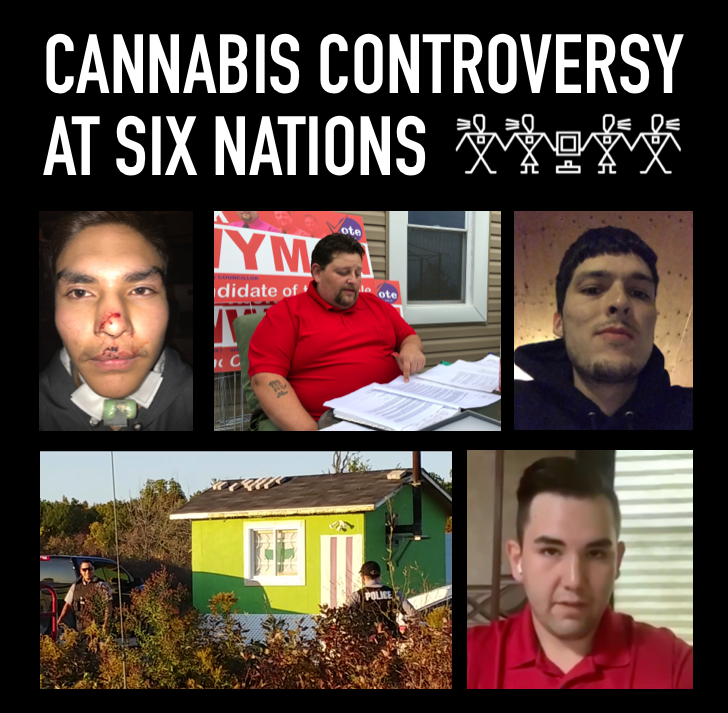




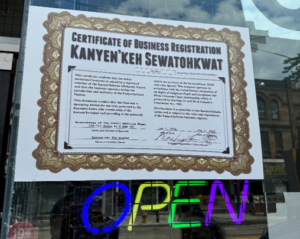


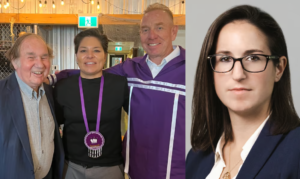
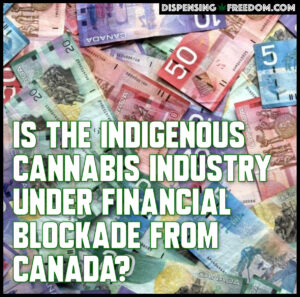


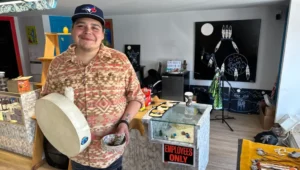
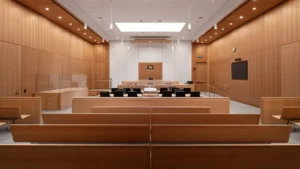

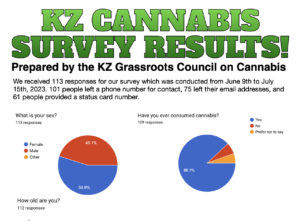
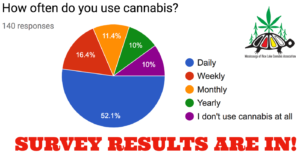
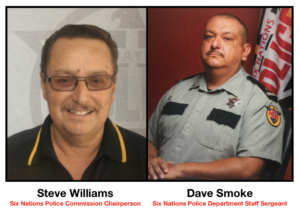

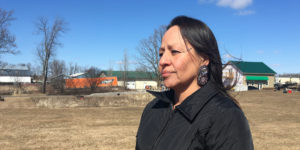
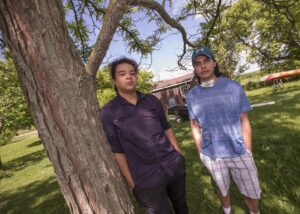
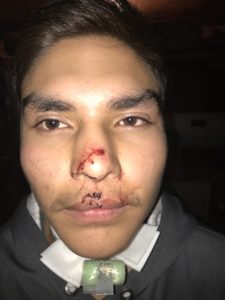
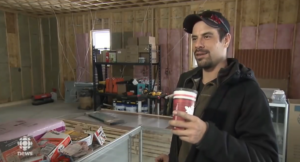


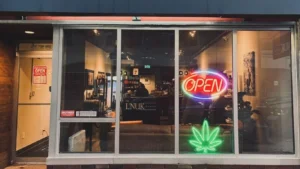
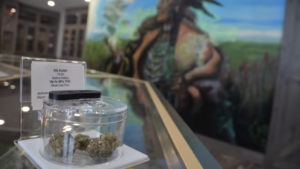

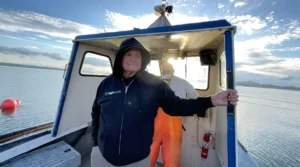
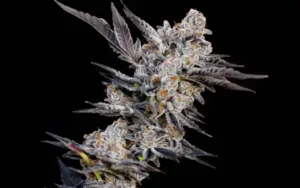
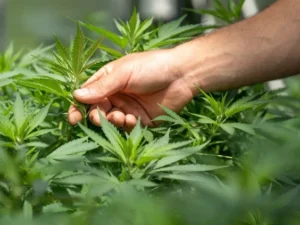
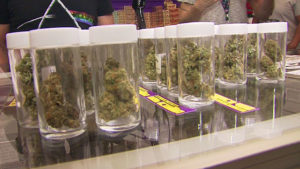
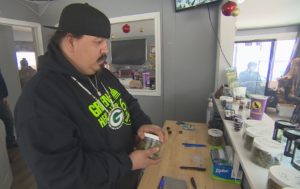

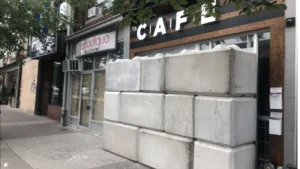
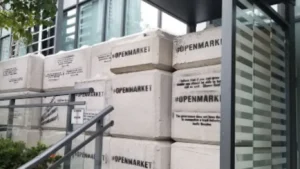
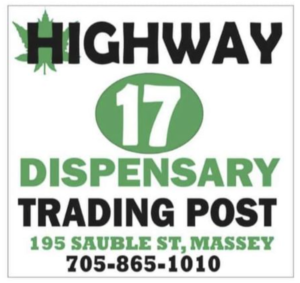

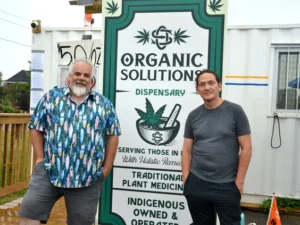
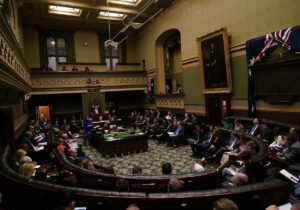
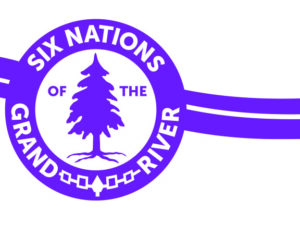

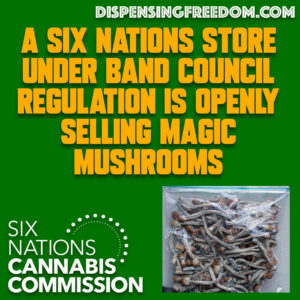

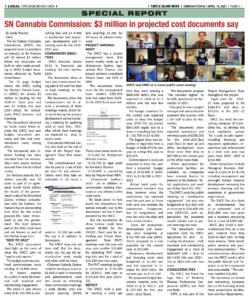
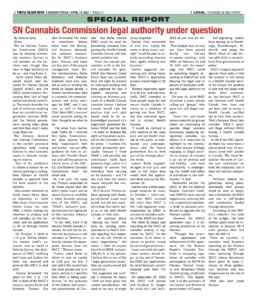


Comments are closed.